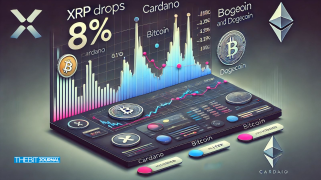
In the world of decentralization, Bitcoin has made a grand comeback, with its value skyrocketing to a whopping $73,000. Not just the OG cryptocurrency, but others like Ethereum and the meme-favorite Dogecoin are enjoying their share of the limelight, propelling the market’s worth over the $2.7 trillion mark for the first time in years. But guess what? You might have missed the memo, considering the buzz isn’t as loud as before. No more chatter about which digital coin will hit the jackpot next or queries about when you’ll be able to buy that Lamborghini. The world’s obsession seems to have dialed down a notch, at least for now.
The Unexpected Rise
Crypto’s resurgence in 2024 paints a rather muted picture compared to the frenzied rallies of the past. Gone are the days of ICO madness or the NFT craze. This time, the surge seems to be riding on more mundane factors like the upcoming “halving” event, which will slash the bitcoin mining reward by half, whispers of dropping interest rates, and a significant influx of institutional money into bitcoin ETFs, thanks to the green light from the U.S. Securities and Exchange Commission.
BlackRock, the titan of asset management, didn’t just enter the crypto space; it bulldozed its way through, with its ETF quickly becoming a behemoth in the arena. Major banks are also queuing up to dip their toes in the Bitcoin pool, seemingly forgetting the bitter lessons of the past financial crisis. This newfound embrace by the traditional finance sector has turned heads within the crypto community. Bitcoin, after all, was birthed with the vision of bypassing these very institutions, offering a decentralized, censorship-resistant alternative to the conventional financial system.
The Paradox of Adoption
Yet, the bitcoin faithful aren’t crying foul. On the contrary, they’re all for institutional FOMO, with predictions of bitcoin hitting the $100k milestone sooner rather than later. The sentiment is clear: the more, the merrier. Having bigwigs like BlackRock’s CEO onside is seen as a boon, aligning everyone’s interests under the bitcoin banner. But let’s not kid ourselves. Institutional investors aren’t in this for the revolution. They see bitcoin as another avenue for profit, not as the future of finance. And while they might flirt with the idea of an Ethereum ETF, their core motives remain as traditional as ever.
This marriage of convenience between crypto and traditional finance (TradFi) highlights a glaring hypocrisy. Crypto’s acceptance of institutional players and vice versa does not signal a newfound respect or understanding between the two worlds. Instead, it underscores a shared greed, an insatiable hunger for more, regardless of the means. The introduction of bitcoin ETFs has blurred the lines between two supposedly distinct financial realms, proving that the lessons of the financial crisis have been ignored. Both spheres, it turns out, are not so different after all, driven by the same old greed.
And there lies the rub, the shared flaw of both centralization and decentralization: greed. It’s the Achilles’ heel that undermines the ideals and promises each system claims to uphold. For all its talk of disrupting and democratizing finance, crypto, when bedded with traditional finance, reveals a willingness to compromise its principles for profit. Similarly, TradFi’s embrace of crypto, despite its past skepticism and caution, shows a readiness to abandon lessons learned from past disasters at the altar of potential gains.
This convergence of interests might seem like a victory for bitcoin proponents, yet it raises critical questions about the future of finance. Are we merely repackaging old vices in new wrappers? Is the revolutionary potential of cryptocurrencies being diluted as they become just another asset class in the portfolios of the very institutions they sought to challenge?


 Thecryptoupdates
Thecryptoupdates The Bit Journal
The Bit Journal Times Tabloid
Times Tabloid CoinoMedia
CoinoMedia U_Today
U_Today ETHNews
ETHNews crypto.news
crypto.news CoinPedia News
CoinPedia News CoinoMedia
CoinoMedia






















